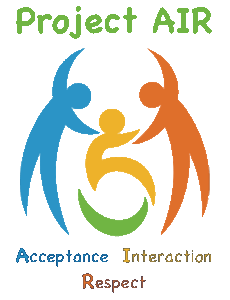About Us

When Kathleen Barajas, Project AIR’s President, became Ms. Wheelchair California 2016, she chose her platform to be “Improve the way society views individuals with more severe disabilities, through acceptance, interaction, and respect”. While she did stress her platform in appearances that she did, she did not have the time to grow the platform that way she would have liked to. Kathleen was determined to one day create an organization that would focus on an issue which is so important to her, and thus Project AIR was born.
Project AIR’s main goal will be to educate communities, business entities, schools, etc about individuals with these types of disabilities. As a person with both a more severe disability and speech impairment, Kathleen has years of experience publicly speaking on this topic, and has already created a few pamphlet on this topic. She distributes her general pamphlet, “Are you Listening” , at every presentation she gives, and a number of attendees have told her that they learned a lot from the presentation, and will be using her pamphlet in work that they do.
In 2018, Kathleen created her second pamphlet based on her experiences as a Metro rider; it is named “Where Is Your Stop: A Communication Guide for Transit Drivers and Riders with Speech Impairments”. This pamphlet specifically targets the request of the transit driver of which stop the passenger in a wheelchair will be getting off at, along with the passenger’s possible inability to give the stop location due to a speech impairment. The pamphlet both addresses the incorrect assumptions of those with more severe disabilities, and offers suggestions of alternative modes of communication in which the transit driver and rider with a disability can use to interact. Kathleen shared this pamphlet with Metro, as she is a member and First Vice-Chair of the Accessibility Advisory Committee. Metro found the pamphlet quite informative and has begun using it in their transit drivers’ trainings. Kathleen was also given the opportunity to do a short video for Metro on this topic. In the near future, one of Project AIR’s first undertakings is to distribute the transit-related pamphlet to other major transit companies in Southern California and throughout the state, in hopes that they will implement it in their transit driver’s trainings as well.
Project AIR will have other goals as well, mostly related, but not restricted, to speech impairments. We want to create educational materials for other types of business entities, such as restaurants, retail shops, and others that have specific business-related interactions that go beyond the scope of our general communication pamphlet. We want to create “speech cards”, which a person with a speech impairment can carry with them. These cards can be handed to whomever they are interacting with, to inform them about their difficulty with speech, and to briefly state how best to proceed with the interaction. We hope to be able to provide these speech cards at either low or no cost to individuals who can benefit from them.
While it is important to provide individuals with disabilities the tools they need for facilitated communication, it is equally important to create educational materials for businesses to train their employees about disabilities. These booklets will be business specific, much like the pamphlet created for transit drivers. The booklets may also include recommended accommodations for the entity, such as lowered sales counters, wider aisles, etc.
Once we get some of the educational materials done, we would like to create videos on the main goals which Project AIR was created on. We hope to get these both on YouTube and Ted Talks, to be able to share to a much larger audience than we normally would be able to.
For our younger generation, we want to create either a simplified version of our general pamphlet, however our dream would be to develop a short story to educate our children about individuals with disabilities and how they should interact with them just like they would do any other person. We also want to give workshops at schools as well. If children can be educated about disabilities at a young age, they will grow up without the ignorance that much of society currently has towards individuals with disabilities.